
Investors funding 16 leading food companies (including Walmart and Tesco) call for them to switch from meat to plant-based proteins
$1trn investor coalition turns up the heat on meat!
A coalition of 40 investment companies behind 16 of the world's largest food companies is pushing for them to switch from meat to plant-based proteins, citing environmental and health concerns over factory farming. The world we live in is absolutely driven by money - so this statement from prominent investment companies will have a huge impact on the future of food production.
The 16 multinational companies are: Unilever, Nestlé SA, Kraft Heinz, Walmart, Tesco, Marks & Spencer, Whole Foods Market, Costco Wholesale Corporation, The Co-operative Group, Sainsbury’s, Ocado, Morrison Supermarkets, General Mills, Mondelez International, Kroger Company and Ahold-Delhaize.
The investment companies, brought together by the Farm Animal Investment Risk & Return (FAIRR) Initiative, wrote to the companies expressing the need to diversify as products composed entirely of plant-based protein continue to gain more popularity and the looming impact of meat production on the planet becomes more apparent.
“The world’s over reliance on factory farmed livestock to feed the growing global demand for protein is a recipe for a financial, social and environmental crisis,” said Jeremy Coller, founder of the FAIRR Initiative and chief information officer of Coller Capital, one of the 40 investment firms behind the letter.
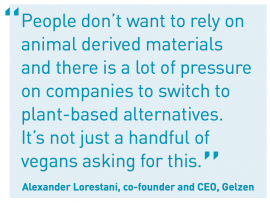
In the document sent to these companies the investors outlined their reasons:
"Over the past half century the growth of the factory farming model and the increasing over consumption of animal products has been taking its toll on the environment and human health. Consumers in early industrial countries now eat far more protein than is needed for optimum health or that the world can sustainably supply. According to current trajectories, by midcentury global meat production is projected to double from its 1999 levels, which will be catastrophic for our climate.Research by Chatham House has indicated that it will not be possible to limit temperate rises to 2˚C – the goal agreed at the UN Climate Change Conference, COP21, in 2015 – if livestock production and consumption are not reduced."
The investors highlighted the health concerns:
"Overconsumption of animal produce is linked to health issues such as diabetes, heart disease and cancer. Overuse of antibiotics in intensive livestock production contributes to antimicrobial resistance. The growth of the livestock sector has also led to food safety scares and pandemics, such as avian flu"
And the cruel and barbaric practices of the livestock industry:
Increasing demand for animal products is driving industrial livestock production, dependent on practices such as close confinement and genetic manipulations focused on high production at the expense of welfare. This model comes with significant reputational risks, especially with consumers increasingly paying attention to welfare and valuing brand transparency.
As well as the environmental impacts:
Environmental impacts are wide-ranging and include deforestation, soil degradation, water and air pollution (all with potentially material impacts for investors). Animal agriculture contributes to resource scarcity that can cause local opposition and conflict. As an example of water inefficiency,it can take 1,800 to 2,500 gallons of water to produce just 1 pound of beef. This can result in water stress in water-scarce regions. Livestock production accounts for 14.5% of GHG emissions (more than the global transport sector);6 with research providing strong evidence that it will not be possible to limit temperature rises to 2˚C if meat and dairy consumption is not reduced from current levels.
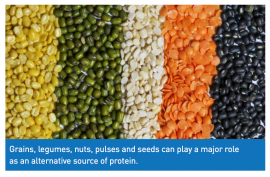
The report recommends we move forward to reducing or eliminating the use of red and processed meat and for "Moving away from meat and dairy as the dominating ingredient in every menu option to instead making them an occasional complement to a meal"
“Intensive livestock production already has levels of emissions and pollution that are too high, and standards of safety and welfare that are too low. It simply can’t cope with the projected increase in global protein demand. Investors want to know if major food companies have a strategy to avoid this protein bubble and to profit from a plant-based protein market set to grow by 8.4% annually over the next five years.”
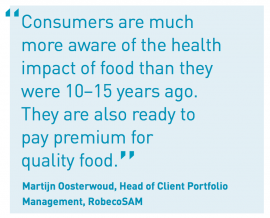 The investors have taken note of Oxford University research that estimates $1.5trn in healthcare and climate change costs could be saved by 2050 if the world reduced its reliance on meat.
The investors have taken note of Oxford University research that estimates $1.5trn in healthcare and climate change costs could be saved by 2050 if the world reduced its reliance on meat.
General Mills, one of the companies targeted by investors, has been praised for supporting start-up Beyond Meat, which has developed plant-based meat burgers which mimic the texture and taste of meat without using animal byproducts.
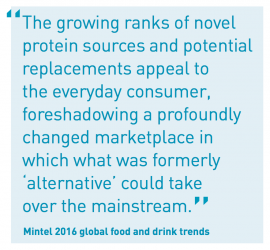 The world is gradually realising the need to shift away from meat. China implemented plans this year to reduce national meat consumption by 50%, over concern its growing obesity problem will cripple health services. Denmark’s influential think-tank, the Danish Council of Ethics, has also suggested red meat taxation may be needed to drive down meat consumption to counteract the environmental impact.
The world is gradually realising the need to shift away from meat. China implemented plans this year to reduce national meat consumption by 50%, over concern its growing obesity problem will cripple health services. Denmark’s influential think-tank, the Danish Council of Ethics, has also suggested red meat taxation may be needed to drive down meat consumption to counteract the environmental impact.
Peter van der Werf, engagement specialist at Robeco, a Dutch asset management firm, said the need to diversify global protein sources is paramount.
“The growing demand for meat will put large pressure on natural resources in the coming decades. Robeco identified this as a financial material topic and engages to improve sustainability in the meat supply chain,” said der Werf.
“Protein diversification is an important instrument to that end. Companies at the end of the meat supply chain have an important role to play towards customers and we will encourage them to make protein diversification an integral part of their strategy.”
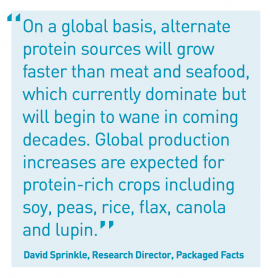 Even the CEO of Tyson Foods, one of the largest meat producers, acknowledges the growing shift towards plant-based foods:
Even the CEO of Tyson Foods, one of the largest meat producers, acknowledges the growing shift towards plant-based foods:
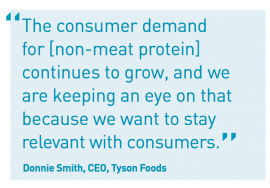
The investors are very worried about the prospect that it won't be long before governments start to take notice of the looming environmental and public health issues and take big steps to cut public meat consumption.
In terms of the driving factors behind this trend, the public health evidence base for such a shift is increasing:for example, within recent months there has been widespread reporting of research that animal protein is a significant factor in the obesity crisis and that red meat is linked to kidney damage. The World Health Organization also recently classified red and processed meats as carcinogenic. Though the UK’s recently revised ‘eat well’ guidelines specifically recommend a reduction in consumption of red and processed meat, medical professionals – for both health and environmental reasons – advocate for a recommendation to eat less meat overall. Similarly, in the US there is an acknowledgement within government circles that the environment and sustainability should be considered alongside health in food policy, and the US Department of Agriculture has its own certification standard to help producers tap into a $43 billion domestic market for organic produce. However, despite significant red flags from the medical profession and scientists as seen previously with regard to the tobacco industry, most governments have – so far at least – run shy of tackling this issue head on. How long governments can continue to prioritise trade over public health and the environment is a matter of debate.
And
"Market analysis and sales over recent years have shown that consumers are increasingly aware of the detrimental impacts of a heavily meat-based diet and are moving to cut back on its consumption. With the clock ticking on climate change and an imminent public health crisis, some governments are already moving to legislate against highly polluting and potentially carcinogenic foods."
With the weight this investor group carries it looks a lot like Google CEO Eric Schmidt's prediction for plant-based protein to be one of the biggest trends going forwards is true.
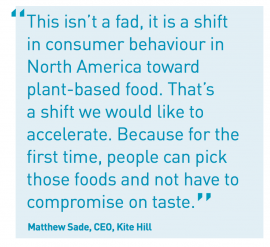
Here's a link to the full report:
Subscribe!
Love this content?
Receive our awesome newsletter straight to your Inbox!

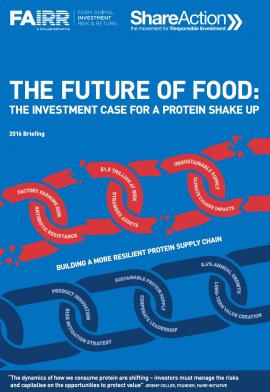
 Your email address will always stay private.
Your email address will always stay private.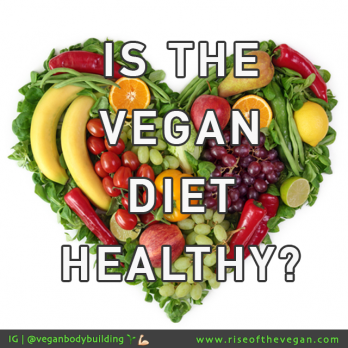
















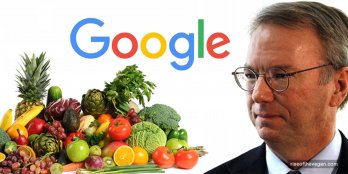
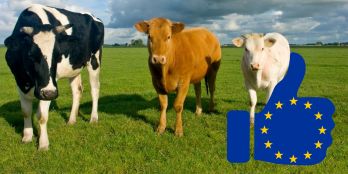
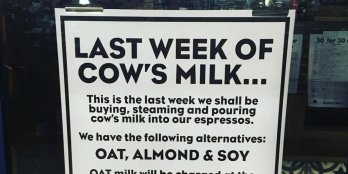


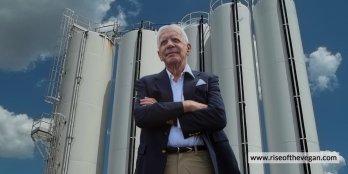


Comments